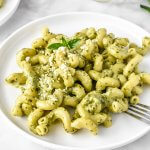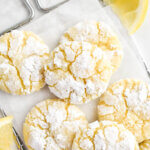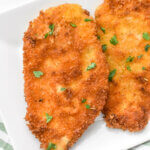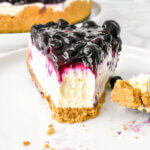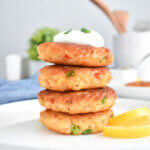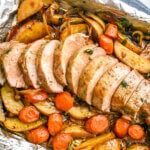This Lagana recipe produces a traditional Greek Flatbread that is often baked at the beginning of lent season on Clean Monday or “Kathari Deftera”.
Lagana is one of those traditional recipes that mark the Easter season in a Greek Orthodox home. This traditional flatbread recipe is often made and enjoyed just one day a year- the first day of lent or Kathari Deftera (Clean Monday). During lent, Orthodox Christians refrain from eating most animal products including meat, most fish (only fish without blood is permitted such as shellfish and calamari) eggs, and dairy products. Some also abstain from eating oil, but this varies from household to household.
True to Greek fashion, the kick off to the lenten season is met with lots of delicious traditional foods. This lagana recipe takes center stage, alongside other traditional lent recipes such as Taramosalata and halva (a Semolina pudding).
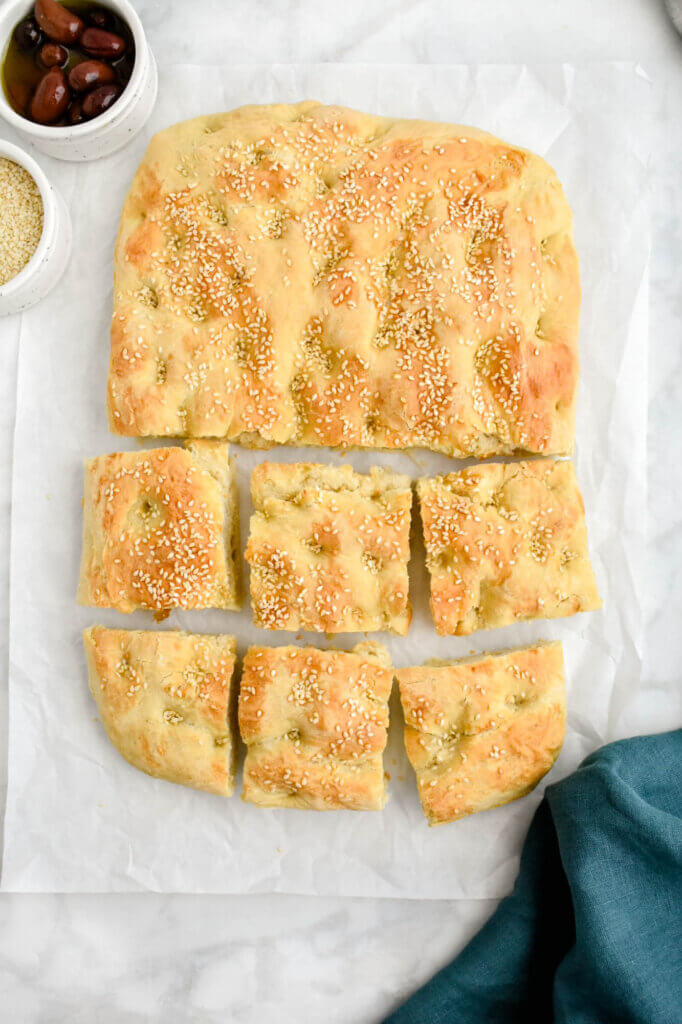
The ingredients to make this lagana is simple and the steps are easy and straightforward. The end result is a delicious flatbread sprinkled with white sesame seeds (as is traditional). Lagana looks similar to Italian Focaccia bread with its flat rectangular shape, though it is lighter in texture and uses significantly less olive oil.
This Greek bread is perfect for snacking on with taramosalata (fish roe dip) and olives. You can also serve lagana alongside other lenten dishes such as Fasolada, Spanakorizo, Fasolakia, Dolmades, or Greek Lentil Soup.
If you are about to head into fasting season and looking for more recipes to enjoy, be sure to check out my category for Lenten Recipes for more meal ideas!
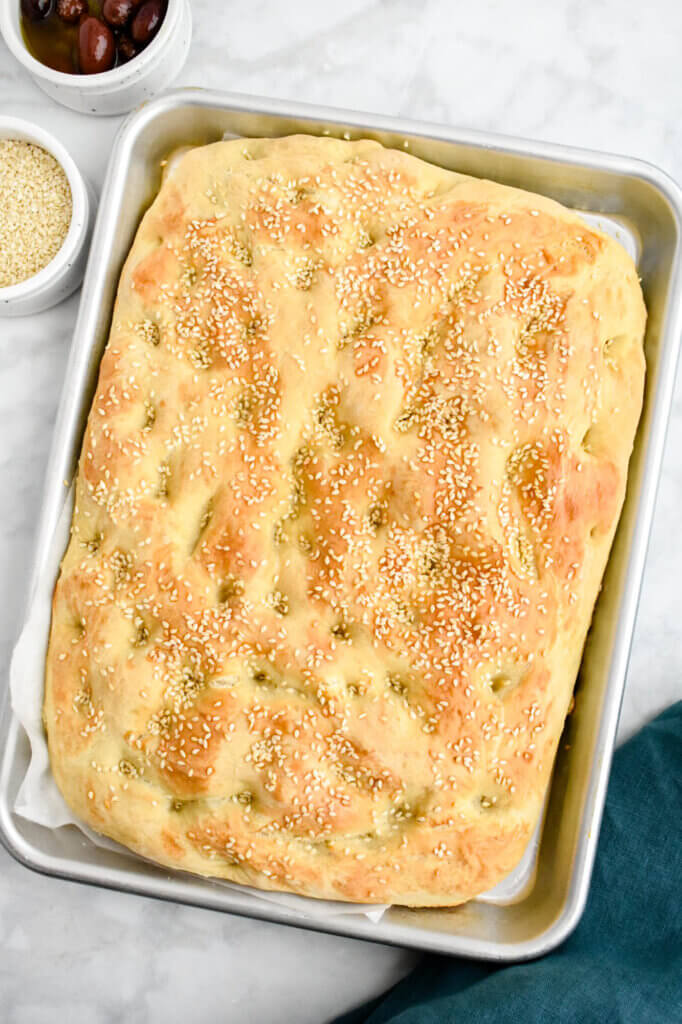
Ingredients in Lagana Flatbread
The ingredients found in this great vegan flatbread recipe are simple and common to many other types of breads. It doesn’t contain any ingredients that are not lenten friendly such as butter or milk.
To make this traditional lagana bread, you will need:
- Active Dry Yeast: Be sure to use fresh yeast. If your yeast is not fresh, you will notice in the first step that the yeast does not foam. If this is the case, discard it and begin the recipe again with fresh yeast. I store my yeast in the fridge to prolong its shelf life and ensure freshness.
- Water: Lukewarm water is used to help activate the yeast. In a later step, room temperature water is added to help form the dough as well.
- Sugar: We use sugar to feed and activate the yeast. It is also used to form a sugar water glaze that is brushed over the dough before it is baked.
- Olive oil: Good quality extra virgin olive oil is preferable.
- Salt
- Flour: You can use bread flour or all purpose flour for this recipe, with no change to the recipe required when substituting one for the other.
- Sesame seeds: traditionally sprinkled over the surface of the lagana before baking.
Note: Ingredient quantities and full instructions are in the recipe card at the end of this post.
Preparing this Greek Lagana Bread Recipe
As mentioned earlier, the steps for making lagana bread are easy and straight forward. You do not need any fancy equipment…including a stand mixer, though you can certainly use one if you wish too. I often use just a large mixing bowl, wooden spoon, and my hands to prepare this type of flatbread.
Simple Steps for making this lagana recipe:
1. Proof the yeast: To a large bowl (or alternatively to the bowl of a stand mixer if you choose to use one), add the active dry yeast, sugar, and lukewarm water. Gently mix to combine and then let it sit for 5 minutes until it begins to foam. [Note: if the yeast does not begin to foam, allow for 5 more minutes. If it is still does not activate, you may have to discard and use fresher yeast as it may no longer be good.]
2. Prepare the dough: Next, add the remaining room temperature water, olive oil, and salt to the yeast mixture. Initially add about 4 cups of flour and begin to mix the dough together, slowly adding more dough until the dough is soft and slightly sticky to the touch. You will likely end up using between 5 1/2 to 6 cups of flour. Knead the dough for about 3 minutes. The dough should pull away from the sides of the bowl when it is ready. [Note: you can use a stand mixer with a dough hook attached for this step. I opt to use the lowest speed on my mixer for bread recipes.]
3. First Rise: Cover the bowl with plastic food wrap and a clean kitchen towel and place it in a warm place to allow the dough to rise and double in size (for about 1 hour).
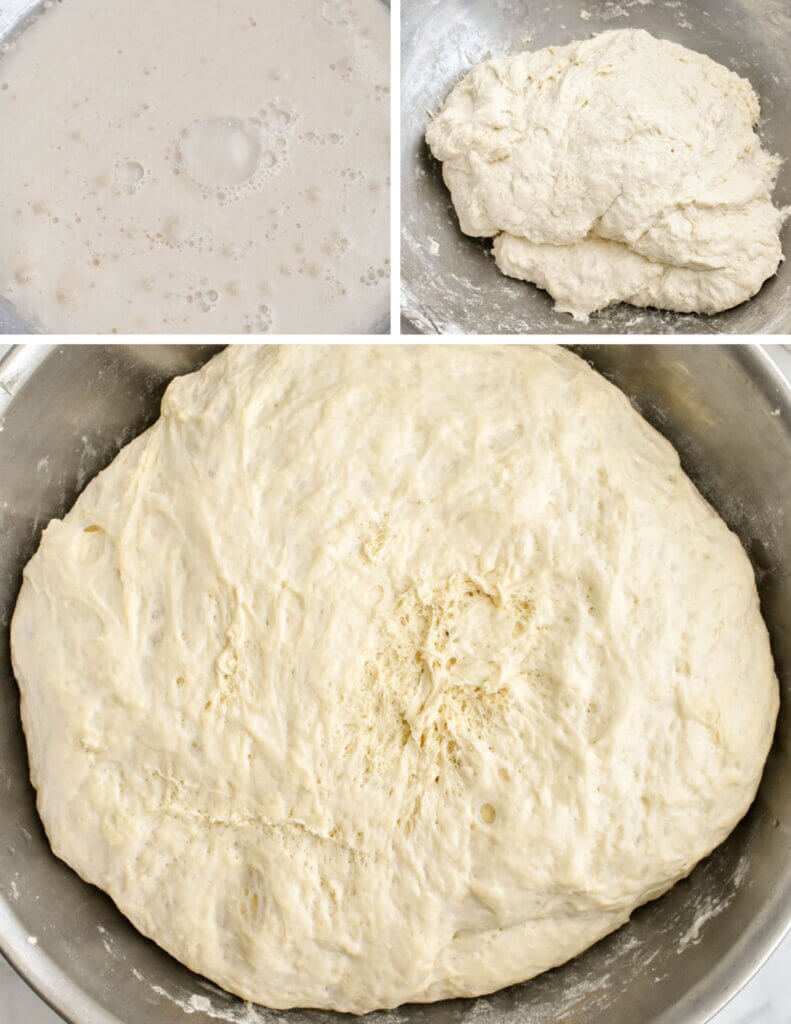
4. Prep the baking pan: Place parchment paper in a sheet pan and sprinkle with a little flour. I use a large sheet pan to make 1 loaf of lagana.
5. Shape the lagana and allow for a second rise: Grease your hands with a little olive oil and then transfer the risen dough to the sheet pan, pressing it to form a rough rectangular shape (similar to how you would stretch and press pizza dough). Let the dough rest for 30 minutes to rise again. Meanwhile, preheat the oven to 350F.
6. Dimple the dough and glaze: Use your fingers to make dimples in the dough (similar to Italian focaccia bread, this gives the flatbread an authentic last touch). Then, you will need to mix the water and sugar to create the glaze and brush it over the surface of the lagana bread using a pastry brush. Finally, sprinkle the dough with sesame seeds.
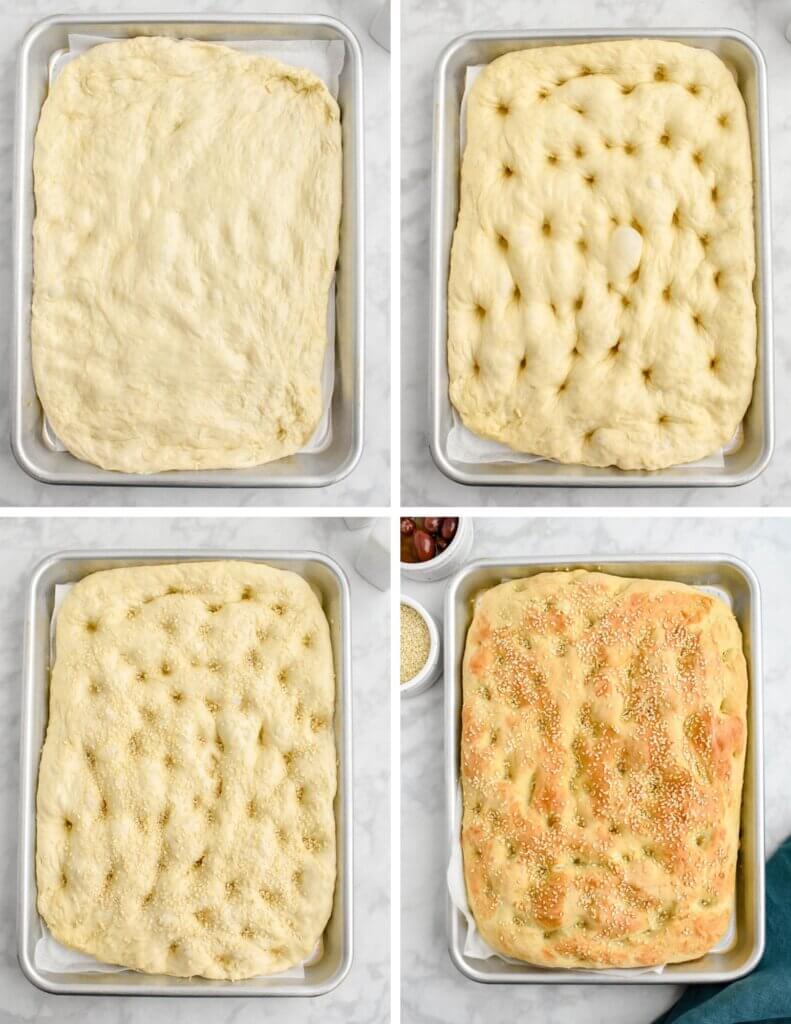
7. Bake: Bake the dough in the preheated oven for about 35-40 minutes or until golden brown.
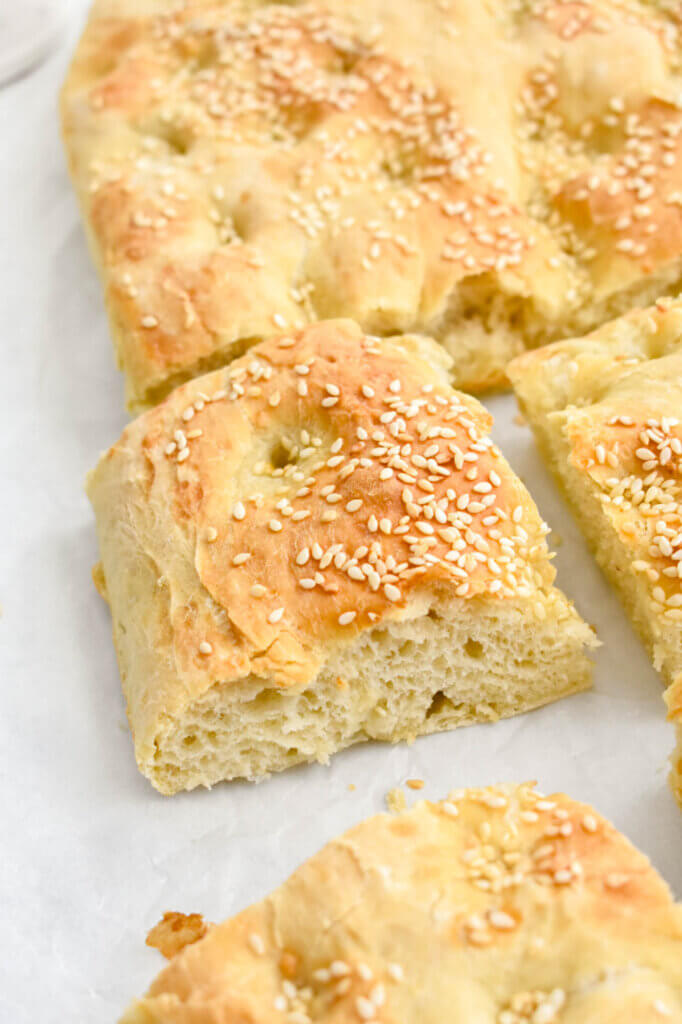
What to serve with lagana bread
As mentioned earlier, lagana flatbread is served on the first day of Great Lent. This Greek orthodox tradition of serving lagana bread is usually accompanied by other lenten foods such as olives, taramosalata. It can also be served with lenten food like Fasolakia, Dolmades, and Fakes, among others.
Please check out my lenten recipes for more ideas on what to enjoy on Clean Monday and throughout the lent Fasting period.
I hope you enjoy this family recipe as much as we do!
-Cathy
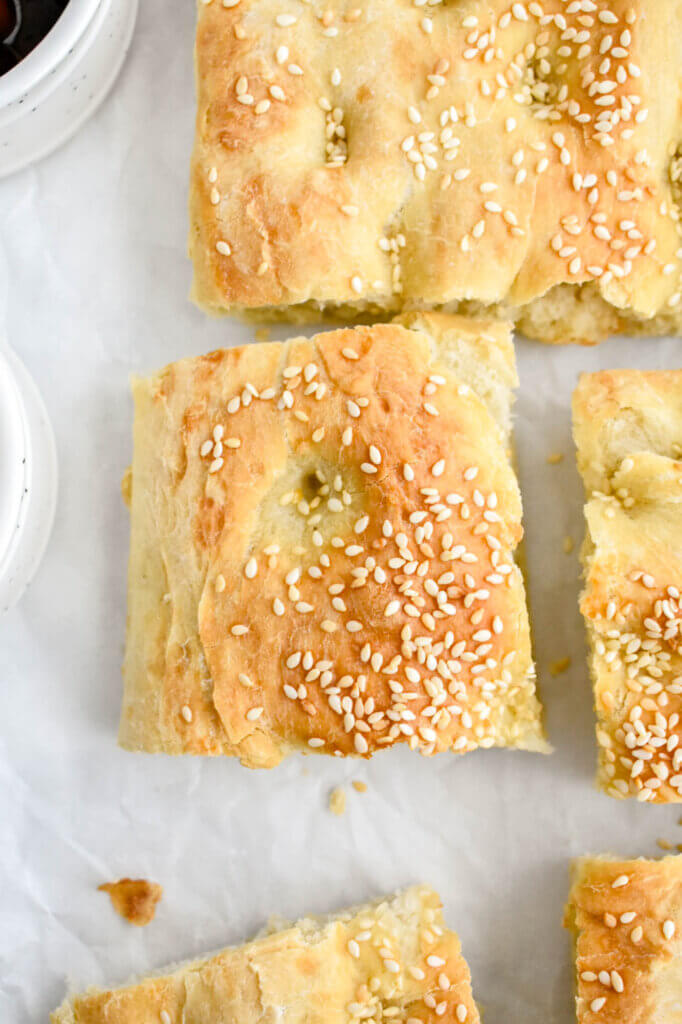
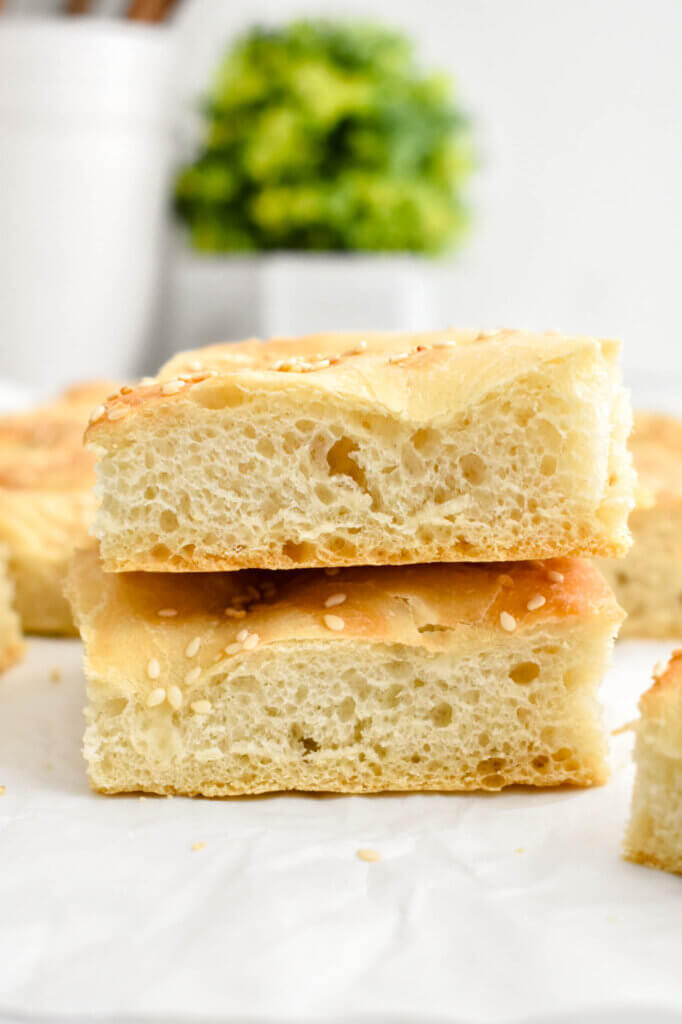
You may also like:
Fasolada (Greek White Bean Soup) Recipe
Taramosalata Recipe
Spanakorizo Recipe (Greek Spinach and Rice)
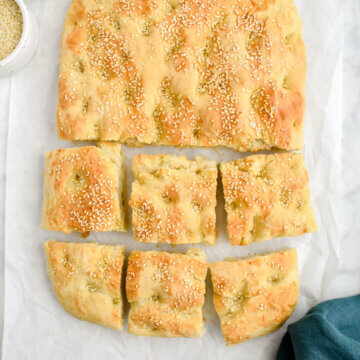
Lagana Recipe (Greek Flatbread)
Ingredients
- 2 teaspoons active dry yeast
- 1 cup lukewarm water
- 1 teaspoon sugar
- 1/4 cup olive oil
- 1 tablespoon salt
- 2 cups room temperature water
- 5 1/2 – 6 cups flour bread flour or all purpose flour
Glaze
- 1 teaspoon sugar
- 2 tablespoons water
- 1 1/2 tablespoons sesame seeds
Instructions
- To a large bowl (or alternatively to the bowl of a stand mixer if you choose to use one), add the active dry yeast, sugar, and lukewarm water. Gently mix to combine and then let it sit for 5 minutes until it begins to foam. [Note: if the yeast does not begin to foam, allow for 5 more minutes. If it is still does not activate, you may have to discard and use fresher yeast as it may no longer be good.]
- Next, add the remaining room temperature water, olive oil, and salt to the yeast mixture. Initially add about 4 cups of flour and begin to mix the dough together, slowly adding more dough until the dough is soft and slightly sticky to the touch. You will likely end up using between 5 1/2 to 6 cups of flour. Knead the dough for about 3 minutes. The dough should pull away from the sides of the bowl when it is ready. [Note: you can use a stand mixer with a dough hook attached for this step. I opt to use the lowest speed on my mixer for bread recipes.]
- Cover the bowl with plastic food wrap and a clean kitchen towel and place it in a warm place to allow the dough to rise and double in size (for about 1 hour).
- Place parchment paper in a sheet pan and sprinkle with a little flour. I use a large sheet pan to make 1 loaf of lagana. Alternatively, you can make two smaller flatbreads if you prefer to.
- Grease your hands with a little olive oil and then transfer the risen dough to the sheet pan, pressing it to form a rough rectangular shape (similar to how you would stretch and press pizza dough). Let the dough rest for 30 minutes to rise again. Meanwhile, preheat the oven to 350F.
- Use your fingers to make dimples in the dough (similar to Italian focaccia bread, this gives the flatbread an authentic last touch). Then, you will need to mix the water and sugar to create the glaze and brush it over the surface of the lagana bread using a pastry brush. Finally, sprinkle the dough with sesame seeds.
- Bake the dough in the preheated oven for about 35-40 minutes or until golden brown.
Note: Metric ingredient measurements are provided as a courtesy using a third-party calculator and are rounded to the nearest unit. The recipes provided on this site have not been tested with metric measurements and their accuracy cannot be verified.
Nutrition
The nutritional information provided is based on third-party calculations and is an estimate only. Accurate nutritional facts will vary based on the particular brands used, portion sizes, measurement accuracy and more.



